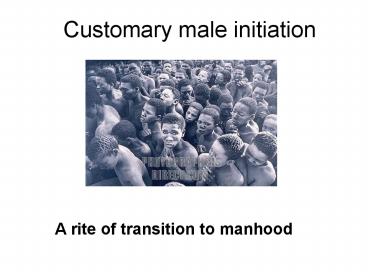Customary male initiation - PowerPoint PPT Presentation
1 / 18
Title:
Customary male initiation
Description:
Has it remained loyal to the original motivations our traditional forebears? ... The reuse of unsterilised surgical instruments like blunt assegais to all the ... – PowerPoint PPT presentation
Number of Views:427
Avg rating:3.0/5.0
Title: Customary male initiation
1
Customary male initiation
- A rite of transition to manhood
2
Is customary male initiation a good Practice?
3
Questions
- What is customary male initiation?
- Who practices it?
- Does it make one man enough?
- Why is customary male initiation a health issue?
- Has it remained loyal to the original motivations
our traditional forebears? - How does it affect human rights issues?
- How can the practice be regulated?
4
What is customary male initiation?
- A rite of transition to from boyhood to manhood
with the aim of integrating the male child into
the society according to cultural norms
5
- It involves
- seclusion (entering the bush and building
temporary lodge) - burning of temporary lodge and belongings at the
close of the seclusion - physical symbols inscribed on the body-
- e.g. painting of the skin with white clay, and
permanent bodily alterations like circumcision - celebrations of the change in status where ritual
sacrifices are performed
6
- Performed by
- traditional surgeons (ingcibi)
- traditional attendants (ikhankatha), who only
give assistance
7
Who practices it?
- Different cultures locally and abroad
- The Jewish, African and Islamic culture
practice it - In South Africa the cultural groups that are
still practicing the rite are the Tswanas,
Sothos, Shangaan-Tsongas and Xhosas - Historically the Zulus practiced it, but has been
largely abandoned
8
Does it make one man enough?
- As a symbol of transition to manhood initiated
men have certain privileges associated with their
status - They assume certain social responsibilities like
officiating in ritual ceremonies - Before initiation a male cannot marry or start a
family and inherit possessions - Their vocabulary and social behaviour distinguish
them from boys
9
- Endurance to harsh conditions such as walking
long distances and not drinking fluids post
circumcision and being severely beaten makes
the initiates man enough - Death and injury is seen as a way of separating
boys who were not fit to play the role of men in
a society
10
Why is customary male initiation a human health
issue?
- The reuse of unsterilised surgical instruments
like blunt assegais to all the initiates is
implicated in the spread of blood-borne diseases
like Tetanus, Hepatitis and HIV/AIDS - Severe dehydration is another health risk factor.
Initiates are discouraged from drinking fluid
post circumcision to prevent frequent urination
11
- death due to Crush syndrome
- that comes as a result of initiates being
severely beaten for failing to adhere to schools
protocol, or as a test of endurance - unhealthy surroundings, like, cold and dusty
holding rooms - starvation of the blood supply (Ischaemia) and
infection lead to sepsis of the reproductive
organ
12
How does it affect human rights issues?
13
How can the practice be regulated?
- Government as the guarantor for basic human
rights has introduced the following Acts - Application of Health Standards in Traditional
Circumcision Act (2001)-Eastern Cape - Northern Province Circumcision Schools Act (1996)
- Free State Initiation School Health Act (2004)
- The National Health Bill
- Traditional Health Practitioners Bill
14
The following regulations are stipulated in the
Acts
- Observation of health standards in initiation
schools - Granting permission by a medical practitioner for
- the operation of circumcision
- Males under 18 must be accepted upon
- parents consent
- Compulsory medical screening of would be
initiates - Medical officers including women must be involved
15
Has it remained loyal to the original motivations
our traditional forebears?
- Which are to
- teach culture
- advance family values
16
- Most initiation schools are taken over by
opportunistic criminals hence are characterized
by - Alcohol abuse, dagga smoking, lack of regulations
which are the major causes of deaths - Moneymaking practice of charging a price money
and two goats - Detaining males without parents concern to be
initiated in foreign regions - Currently initiation schools occur is summer as
opposed to winter in the past - The use of plastic building material as opposed
to traditional grass and leaves, contribute to a
harsh environment that is not conducive to
healing - All these do not represent the original
motivation
17
What analysis can you make from this background
information?
- Gross violation of human rights associated with
the rite culminate in - deadly infections, callous atrocities
- abduction of under-aged children without parental
consent. - loss and mutilation of reproductive organs due
to the negligence of traditional surgeons - The constitution of our country
- protects the culture and customs of our
communities - allows government to regulate the health aspects
of cultural initiation
18
Is customary male initiation a good practice?
It cannot be a good practice if it violates the
human rights
It is a good practice if it upholds the original
motivation of traditional forebears which is to
teach culture and to uphold family values
It needs to be regulated
To learn more about the Bill of Rights click on
the link































